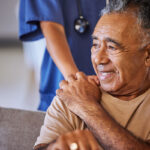
Now Enrolling: EA8211/SOAR for Patients with Advanced Kidney Cancer
October 19, 2023
From the Co-Chairs, October 2023
October 19, 2023Now Enrolling: Social Genomics Study EAQ211 to Examine Known Biomarkers of Elevated Health Risk in Adolescent and Young Adult Cancer Survivors

EAQ211 – Social Genomic Mechanisms of Health Disparities among Adolescent and Young Adult (AYA) Survivors of Hodgkin and Non-Hodgkin Lymphoma
The study chair for this trial is Bradley J. Zebrack, PhD (University of Michigan). The study co-chair and laboratory chair is Steven W. Cole, PhD (University of California, Los Angeles).
Two national research leaders in social genomics have joined the ECOG-ACRIN Cancer Research Group to lead a new clinical trial examining known immune cell biomarkers of elevated health risk in 2,000 adolescent and young adult (AYA) lymphoma survivors. Bradley J. Zebrack, PhD and Steven W. Cole, PhD, are the lead investigators for the observational study EAQ211, which aims to better understand how the world that young survivors live in affects the outcomes of their cancer treatment.
Through a series of blood tests and patient questionnaires, this prospective observational study seeks to establish associations between social-environmental risk factors, such as exposures to trauma and other adverse life experiences, and alterations in the activity of genes and immune cells in post-treatment survivors. Researchers will also study the impact of such alterations on subsequent health outcomes (i.e., morbidity, mortality, quality of life). The tests will detect the presence of the Conserved Transcriptional Response to Adversity (CTRA) RNA profile in participants.
Dr. Zebrack brings expertise in psychosocial oncology, oncology social work, and health services research. Dr. Cole is a research pioneer in the CTRA physiological pattern and currently leads the NIH-funded Social Genomics Core Laboratory at UCLA.
Since 2007, gene expression profiling studies in people exposed to multiple adverse life events that lead to chronic health risks have identified the CTRA pattern in circulating immune cells. The pattern involves increased expression of genes involved in inflammation (e.g., IL1B, IL6, IL8/CXCL8, TNF) and decreased expression of antiviral genes (e.g., IFI-, MX-, and OAS-family genes). Dr. Cole's 2019 publication describes how CTRA, measured by RNA extraction (from blood samples) and sequencing, provides a genomic framework for connecting macro-level psychosocial processes to the micro-level biology of health and disease.
Physicians need better methods to identify health risks and more effective survivorship care plans for their AYA cancer patients. For these patients, life after cancer treatment can be a time of significant transition, including new schedules, stressors, freedoms, and risks of developing delayed side effects from treatment. Though finishing treatment is a milestone to celebrate, it can also be a time of fear, uncertainty, and anxiety. Young people who complete treatment may also be navigating issues around work, school, housing, finances, body image, sexual health and relationships, friendships, and more.
Compared to children and older adults who survive cancer, AYAs are at higher risk for developing multiple health problems over their lifetimes. There is a prevalence of asthma, chronic obstructive pulmonary disorder, diabetes, cardiomyopathy, stroke, premature ovarian failure, chronic liver disease, and renal failure. They have the highest absolute excess risk of subsequent primary malignancies among all age groups and worse survival after their subsequent cancers than older adults.
The primary objective of EAQ211 is to establish the association of social-environmental risk factors on disease-free and overall survival. It builds upon evidence of social factors (i.e., social determinants of health) affecting population health outcomes and on several studies by Dr. Cole and colleagues documenting CTRA gene alterations in older cancer patients with breast, ovarian, prostate, and hematopoietic malignancies.
EAQ211 is enrolling survivors of Hodgkin or Non-Hodgkin lymphoma, aged 15-39 years when first diagnosed and at least 18 at the time of study recruitment, who have completed treatment within the past year and are disease-free. Participants will provide a blood sample and complete a health status survey at the start of the study. Then, they will complete the survey and give a blood sample every 6 months for 2 years. Mobile phlebotomy will be available if sites are unable to obtain a blood sample in the clinic. Starter kits with a specialized PAXGene® Blood RNA Tube can be shipped to sites upon request to ayasocialgenomics@umich.edu.
Young adult survivors have collaborated with the investigators to create study promotional materials that elevate their voices to encourage study participation. These include a brief 3-minute video produced by and for AYAs to share with eligible participants during recruitment.
The survey (PROMIS®-29+2) asks various questions about participants' physical and mental health, environment, and quality of life. Higher scores for pain interference, fatigue, sleep disturbance, anxiety, and depression represent a greater symptom burden. Lower scores represent worse physical functioning, social participation, and cognitive functioning. The surveys will each take about 20 minutes to finish and can be completed online either in the clinic or elsewhere. There is 24/7 access to a life crisis hotline to ensure support for participants' emotional health and well-being. Hotline number: 800-273-8255. Online chat: https://988lifeline.org/chat/.
Learn more about EAQ211 at ecog-acrin.org.
The study epidemiologist is Ilana F. Gareen, PhD (ECOG-ACRIN Biostatistics Center at Brown University). The community co-chair is Pinki Prasad, MD (Louisiana State University). The Cancer Control and Outcomes Program co-director is Lynne I. Wagner, PhD (University of North Carolina-Chapel Hill). The Health Equity Committee chair is Melissa A. Simon, MD, PhD and the co-chair is Edith P. Mitchell, MD. The Adolescent and Young Adult Subcommittee chair is John M. Salsman, PhD. The Lymphoma Committee chair is Brad S. Kahl, MD (Washington University in St. Louis).
The study champion for the Children's Oncology Group is Susan K. Parsons, MD, MRP (Tufts Medical Center). Other champions for the Alliance for Clinical Trials in Oncology, NRG Oncology, and SWOG Cancer Research Network are forthcoming.
The Cactus Cancer Society, Cervivor, TeenCancerAmerica, and The Leukemia & Lymphoma Society are raising awareness about the study among their constituents.
![ECOG-ACRIN logo[19516]275×75](https://blog-ecog-acrin.org/wp-content/uploads/2021/03/ECOG-ACRIN-logo19516275x75.png)
